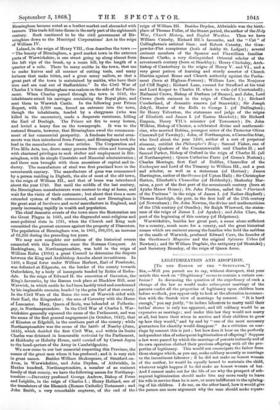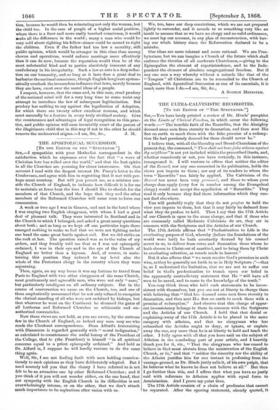LEGITIMIZATION AND ADOPTION.
[To TILE EDITOR OF TIIE "SPECTATOR."]
SIR,—Will you permit me to say, without disrespect, that your article this week on "Illegitimacy" seems to contain a certain con- fusion? In discussing the question of the expediency of such a change of the law as would make subsequent marriage of the parents confer all the properties of legitimacy upon children born before wedlock, you appear only to look at the alteration in connec- tion with the Scotch view of marriage by consent. "it is hard enough," you say justly, "to induce labourers to marry until their brides' shame is only too apparent, and till celibacy would be as expensive as marriage ; and under this law they would not marry at all, but leave their wives in service and their children to grow up how they would," and by and by "one of the most necessary guarantees for chastity would disappear." As a criticism on mar- riage by consent this is just ; but how does it bear on the perfectly independent idea of subsequent legitimization of offspring? Suppose a law were passed by which the marriage of parents instantly and of its own operation clothed their previous offspring with all the pro- perties of legitimacy. This would not emancipate the father from those charges which, as you say, make celibacy as costly as marriage to the incontinent labourer ; if he did not make an honest woman of the mother, he would be equally bound to maintain the child, whatever might happen if he did make an honest woman of her. And I cannot make out for the life of me why the prospect of sub- sequent legitimization should make him any more ready to leave his wife in service than he is now, or more indifferent to the upbring- ing of his children. I do see, on the other hand, how it would give the parson one more argument why the man should make repara-
tion, because he would then be reinstating not only the woman, but the child too. In the case of people of a higher social position, where there is a finer and more easily touched conscience, it would snake all the difference in the world ; many a man who would be very cold about righting his fellow-sinner could be moved to right the children. Even if the father had too low a morality, still public opinion, which would be stronger in this class than among clowns and operatives, would enforce marriage more effectively than it can do now, because the reparation would then be of the most substantial kind and to parties absolutely innocent of any confederacy in his irregularity. Such a law as ours is a deep reflec- tion on our humanity, and so long as it lasts does a great deal to barbarize the national conscience, though English lawgivers system- atically overlook the tremendous influence that laws, merely because they are laws, exert over the moral ideas of a people.
I suspect, however, that the crass and, in this case, cruel prudery of the national mind will for a very long time to come resist any attempt to introduce the law of subsequent legitimization. But prudery has nothing to say against the legalization of Adoption, for which there are twenty other excellent reasons, and which must assuredly be a feature in every truly civilized society. Give the countenance and advantages of legal recognition to this prac- tice, and public opinion will soon invariably exact of the parent of the illegitimate child that in this way if not in the other he should
remove the undeserved stigma.—I am, Sir, &c., J. M.































 Previous page
Previous page